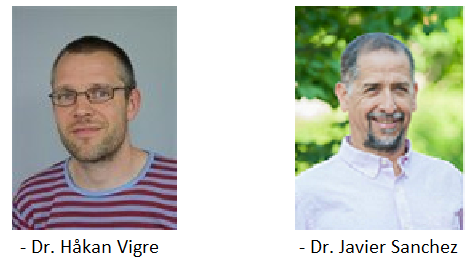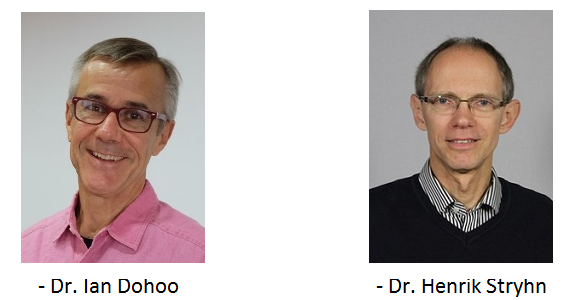June 3 – 7 & June 24 – 28
Module 1: Survival Analysis (schedule)
June 3 – 7
Instructors: Professors Ian Dohoo and Henrik Stryhn,
CVER, AVC, University of Prince Edward Island (UPEI)
A 5-day intermediate to advanced course (schedule) on the analysis of time-to-event (survival) data. The course is organized in a series of lectures that will cover the basic of survival analysis and the introduction of more advanced topics such as frailty models and analysis of discrete survival data. The lectures will be alternated with computer labs to apply the concepts to practical examples. In addition, the participants will have the opportunity to discuss their own data and present a small project at the end of the course. General statistical concepts and methods covered in this course include survival and hazard functions, Kaplan-Meier plots, log-rank and related tests, the Cox proportional hazards model, extended Cox models for time-varying covariates, parametric models, and frailty models. The software used for instruction will be Stata and R.
Module 2: Applied Course in Quantitative Risk Modelling for
Animal Health and Food Safety (schedule)
June 24 – 28
Instructors –
Dr. Håkan Vigre, National Food Institute, Technical University of Denmark
Dr. Javier Sanchez, CVER, AVC, University of Prince Edward Island This course will provide an overview of the “risk concept” applied to animal health and food safety and how risk assessment is used to support a risk management decision. Participants will be introduced to different approaches related to the use of risk assessment such as import risk assessment and food safety risk assessment, with emphasis in microbiological risks. The focus of the course will be quantitative modelling and how data and probability distributions are used in risk assessment. Focus will also be on how to model uncertainties in risk assessment.
This course will provide an overview of the “risk concept” applied to animal health and food safety and how risk assessment is used to support a risk management decision. Participants will be introduced to different approaches related to the use of risk assessment such as import risk assessment and food safety risk assessment, with emphasis in microbiological risks. The focus of the course will be quantitative modelling and how data and probability distributions are used in risk assessment. Focus will also be on how to model uncertainties in risk assessment.
After the course the participants will be able to frame questions related to health and food safety that can be assessed using quantitative probabilistic modelling, creating risk pathways and combining data and probability distributions to estimate the risk at the end of the pathway. They will learn how to incorporate different uncertainties in the modelling process using scenario analyses as well as simulations. In addition, the students will be introduced to more advanced modelling technics, using two-dimensional models for modelling variability and uncertainty simultaneously.
The course will be directed to graduate students, researchers, risk assessor and risk managers. Participants are encouraged to bring their own problems to work with during the course. The course will consist of lectures and practical exercises with demonstrations using both Microsoft Excel and the statistical software R. Participants will be provided with codes for the models discussed in class.
REGISTRATION
For each module, the following registration fees apply (amounts are in $Cdn and include taxes and administration fees):
Module 1 – Survival Analysis:
Participant Up to May 4th After May 4th Student* 750 850 Non-student 1300 1400
Module 2 – Applied Course in Quantitative Risk Modelling for
Animal Health and Food Safety:
Participant Up to May 4th After May 4th Student* 750 850 Non-student 1300 1400
*Proof of enrollment in a graduate program at a university (not necessarily UPEI) required
A discount of 10% will be offered for participants taking both Module 1 and Module 2. In order to get the 10% discount for the two courses, be sure to select the category of both modules at the first step of your registration.
Cancellations before May 4th will be fully refunded except for non-recoverable fees associated with the registration system. In case of cancellation before May 27th, an 80% refund will be offered.
Click on the following Eventbrite logo for registering to Epi on the Island Summer Courses 2019.
ACCOMMODATION
Participants will have to book their own accommodations. Below you will find information on places to stay by visiting links to our Tourism PEI website and on campus residences. Please contact the hotel or residence directly to book your accommodation.
The Tourism PEI (http://www.tourismpei.com/index.php3) website will provide you with links to a variety of accommodations across the Island as well as information on places to eat, festivals and events and things to do during your stay.
The UPEI Campus offers residence rooms to conference participants. Choose from one of three UPEI residences, each with its own unique style and amenities. Residence accommodations include free parking, local telephone access, a bed linen and towel exchange service, and 24 hour security.
(http://www.upei.ca/conference/accommodations)
For further inquiries, please contact Jenny Yu at jennyyu@upei.ca.
We look forward to welcoming you to beautiful Charlottetown, Prince Edward Island, this summer!


